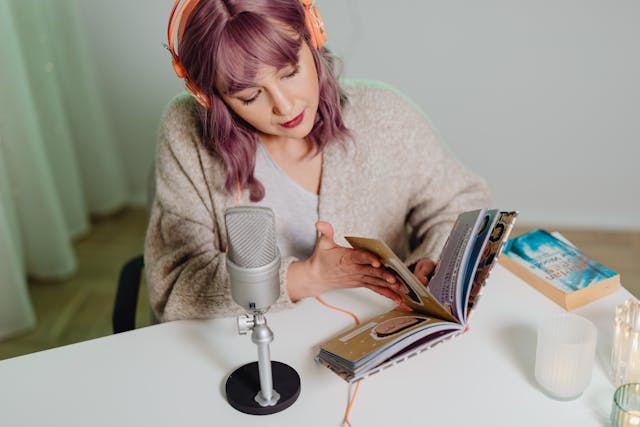In recent years, audiobooks have revolutionized the way people consume literature, transforming moments of idle time into immersive literary experiences. Whether you’re driving, cooking, exercising, or relaxing, audiobooks offer the flexibility to absorb stories, ideas, and knowledge without being glued to a screen or a page. This modern form of reading is convenient, portable, and accessible to virtually everyone, regardless of their daily routine or lifestyle.
The rise of audiobooks is closely tied to advances in mobile technology and the explosion of streaming platforms. Smartphones, tablets, and smart speakers have all made it possible to carry entire libraries in our pockets. From timeless classics to the latest bestsellers, the audiobook format opens new doors to learning, leisure, and storytelling. But for beginners, the options can be overwhelming. Where do you start? What should you look for in a good audiobook? And how do you ensure a rewarding listening experience?
 One of the best places to start your audiobook journey is by exploring platforms and communities dedicated to high-quality content. philosophy and literature is an excellent example of a space that curates thought-provoking works and elevates the audiobook listening experience beyond entertainment. With a carefully selected catalog, they focus on books that challenge, inspire, and intellectually engage listeners — making it an ideal destination for those looking to go beyond mainstream titles and delve into deeper waters of narrative complexity.
One of the best places to start your audiobook journey is by exploring platforms and communities dedicated to high-quality content. philosophy and literature is an excellent example of a space that curates thought-provoking works and elevates the audiobook listening experience beyond entertainment. With a carefully selected catalog, they focus on books that challenge, inspire, and intellectually engage listeners — making it an ideal destination for those looking to go beyond mainstream titles and delve into deeper waters of narrative complexity.
When choosing an audiobook, one key factor to consider is narration. The voice of the narrator can make or break your experience. A skilled narrator not only reads the text but brings it to life — adding personality, emotion, and rhythm. Look for narrators with strong reviews or listen to audio samples before committing. Some of the most celebrated narrators have become stars in their own right, with fans following them from title to title. In contrast, a poor narration can turn even the most compelling story into a tedious ordeal.
Audiobooks also vary in length and structure, which may influence your selection. While some prefer epic sagas that span dozens of hours, others may opt for short stories or essays that fit neatly into a daily commute. Non-fiction works — such as biographies, self-help, or historical analysis — are particularly suited to audio format because of their informative and conversational tone. Fiction lovers, on the other hand, might enjoy dramatized readings, multiple voice actors, or even full audio productions complete with music and sound effects. It’s worth experimenting with genres and formats until you find what resonates with you.
Many platforms offer subscription services, allowing unlimited access to audiobooks for a monthly fee. Audible, Scribd, Audiobooks.com, and Libro.fm are among the most popular, each with its own model. Some offer credits per month, while others provide access to an entire library without limitations. When starting out, consider taking advantage of free trials to compare offerings. Each service caters to different audiences, so choose the one that aligns best with your preferences and budget.
For students and lifelong learners, audiobooks are also a powerful educational tool. Listening can reinforce reading comprehension, improve pronunciation, and make dense material more digestible. It’s especially helpful for people with dyslexia or other reading difficulties, as well as those learning a new language. Academic texts, philosophical treatises, or classic literature become less daunting when experienced through well-produced audio. Learning by listening allows for multitasking, making education more flexible than ever before.
The audiobook world also intersects with personal growth. Motivational books, wellness guides, and meditative narratives are all growing in popularity. There’s something powerful about hearing uplifting words in the author’s own voice — many self-help authors now narrate their books, creating a direct connection with the audience. The intimacy of voice fosters a sense of encouragement and trust that written words alone might not convey. It turns solitary listening into an act of self-care and mental reset.
For those concerned about screen time and digital fatigue, audiobooks are a perfect alternative. They provide entertainment and knowledge while allowing your eyes to rest. You can go for a walk, lie in the sun, or do household chores without disconnecting from literature. This hands-free, eyes-free format is particularly appealing in a world saturated with visual content. It’s a gentle, non-intrusive way to incorporate more books into your life — no scrolling, no swiping, just listening.
There’s also a vibrant audiobook culture developing online. Book clubs, Reddit threads, YouTube channels, and even TikTok creators are recommending titles, reviewing narrations, and debating interpretations. This growing community of listeners mirrors traditional reading circles but with a digital twist. Sharing listening experiences has become a new form of literary engagement, bridging the gap between passive entertainment and active discussion. You’re not just a listener — you’re part of a global conversation.
For families and parents, audiobooks can also be a game-changer. They turn long car rides into educational journeys, bedtime stories into magical routines, and screen-free moments into opportunities for bonding. Many children’s books are available in audio form, often read by enthusiastic performers or even the authors themselves. It helps develop language skills, imagination, and a love for storytelling from a young age. It’s an investment not only in entertainment but in childhood development.
Despite their growing popularity, audiobooks still face skepticism from some traditional readers. Is listening really the same as reading? Can you truly absorb and reflect on ideas without seeing the words on a page? Numerous studies suggest the answer is yes — and in some cases, audio comprehension can match or even exceed reading, depending on the listener’s engagement and context. The brain processes spoken and written words similarly, and what matters most is attention, not medium.
As with any technology, the key to enjoying audiobooks lies in integration. Make them part of your routine: your commute, your workout, your evening wind-down. Create habits around listening, and soon, you’ll find yourself “reading” more books than ever before. Set listening goals, track your progress, and explore new authors or topics. The more you listen, the more you’ll refine your taste and expand your intellectual horizons.
So whether you’re a busy professional, a student, a curious mind, or just someone looking for a more convenient way to read, audiobooks offer a gateway into the world of stories and ideas. They’re not just a substitute for reading — they’re a different way of experiencing literature, one that engages the senses, enhances learning, and fosters deeper connections with content. In a world where time is limited, audiobooks give you the gift of more books, more knowledge, more inspiration.
